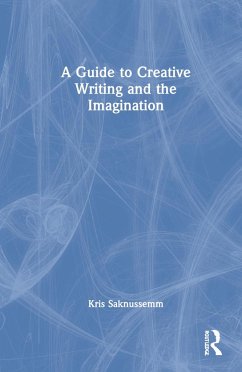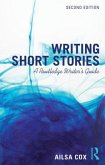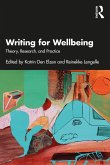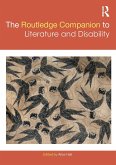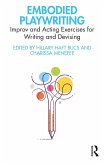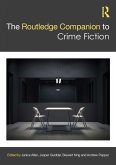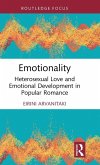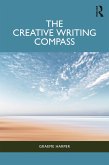Kris Saknussemm
A Guide to Creative Writing and the Imagination
Kris Saknussemm
A Guide to Creative Writing and the Imagination
- Gebundenes Buch
- Merkliste
- Auf die Merkliste
- Bewerten Bewerten
- Teilen
- Produkt teilen
- Produkterinnerung
- Produkterinnerung
Teaching creative writing for the multicultural, global, and digital generation, this volume offers a fresh approach for enhancing core writing skills in the major forms of Poetry, Fiction, Nonfiction, and Drama.
Andere Kunden interessierten sich auch für
![Writing Short Stories Writing Short Stories]() Ailsa CoxWriting Short Stories21,99 €
Ailsa CoxWriting Short Stories21,99 €![Writing for Wellbeing Writing for Wellbeing]() Writing for Wellbeing60,99 €
Writing for Wellbeing60,99 €![The Routledge Companion to Literature and Disability The Routledge Companion to Literature and Disability]() The Routledge Companion to Literature and Disability41,99 €
The Routledge Companion to Literature and Disability41,99 €![Embodied Playwriting Embodied Playwriting]() Embodied Playwriting29,99 €
Embodied Playwriting29,99 €![The Routledge Companion to Crime Fiction The Routledge Companion to Crime Fiction]() The Routledge Companion to Crime Fiction71,99 €
The Routledge Companion to Crime Fiction71,99 €![Emotionality Emotionality]() Eirini ArvanitakiEmotionality46,99 €
Eirini ArvanitakiEmotionality46,99 €![The Creative Writing Compass The Creative Writing Compass]() Graeme HarperThe Creative Writing Compass37,99 €
Graeme HarperThe Creative Writing Compass37,99 €-
-
-
Teaching creative writing for the multicultural, global, and digital generation, this volume offers a fresh approach for enhancing core writing skills in the major forms of Poetry, Fiction, Nonfiction, and Drama.
Hinweis: Dieser Artikel kann nur an eine deutsche Lieferadresse ausgeliefert werden.
Hinweis: Dieser Artikel kann nur an eine deutsche Lieferadresse ausgeliefert werden.
Produktdetails
- Produktdetails
- Verlag: Taylor & Francis Ltd
- Seitenzahl: 274
- Erscheinungstermin: 31. März 2022
- Englisch
- Abmessung: 158mm x 237mm x 22mm
- Gewicht: 548g
- ISBN-13: 9780367691776
- ISBN-10: 0367691779
- Artikelnr.: 62571950
- Herstellerkennzeichnung
- Libri GmbH
- Europaallee 1
- 36244 Bad Hersfeld
- 06621 890
- Verlag: Taylor & Francis Ltd
- Seitenzahl: 274
- Erscheinungstermin: 31. März 2022
- Englisch
- Abmessung: 158mm x 237mm x 22mm
- Gewicht: 548g
- ISBN-13: 9780367691776
- ISBN-10: 0367691779
- Artikelnr.: 62571950
- Herstellerkennzeichnung
- Libri GmbH
- Europaallee 1
- 36244 Bad Hersfeld
- 06621 890
Kris Saknussemm received a B.A. with Distinction from Dartmouth College, double majoring in English and Native American Studies. He holds an M.A. from the University of Washington where he was the Robertson Fellow. His first novel Zanesville was nominated for the Philip K. Dick Award and has gone on to be a cult favorite in translation in Russia and Poland. His novel Private Midnight achieved bestseller status in France and Italy. His work The Memory Wound won First Prize in the Missouri Review Audio Play competition, and the film of his published play The Humble Assessment (which was the featured work at the Las Vegas Fringe Festival and has also been staged in Australia and Sweden) has been screened at 17 international festivals, including two of the world's most prestigious LGBTQ events. His short fiction has won First Prize in the Boston Review Short Story Contest and First Prize in the River Styx Short Short Fiction Contest. In poetry, he has won Australia's Newcastle Poetry Prize and the Mary Gilmore Award. His journalism has appeared in over 300 newspapers and magazines worldwide. His professional photography has appeared in many publications. Two fine arts books of his paintings and visual art have been published in France.
Part 1: Going Wokabout
-Purpose and Plan
-Fevering Forward
-A Multimedia Artist Reflects
-What to Pack
-Three Spiral Paths
-Headwaters
-New Ways for New Days
-Reflections on Publishing from an Agent's Point of View
-Key Takeout Points
-Learning by Imitation
Part 2: Gaining Perspective
-Introductory Parable
-Live the Map
-Present Tense, Future Tenser?
-Of a Fire in the Mind
-The Basic Writing Point of View
-The Unfortunate Perspective of Regret
-A Critical Point of View
-Found in Translation
-People, Place, and Language
-Race, Language, and Culture
-Public Health, Private Healing
-In Conversation with Leland Cheuk
Part 3: Aerial View
-Introductory Parable
-An Underlying Unity
-The Subject is Always...
-Why Should YOU Write?
-What to Write About
-Imagery
-Subjects / Themes / Premises / Concepts
-Titles
-Characters
-Setting
-Plot
-Voice / Style
-Narrative Perspective
-Conflicts
-Suspense / Surprise
-Tone
-Transitions
-Grammar
-Accuracy & Ethos (Authorial Authority / Credibility)
-Revision
-Well Made Things (Holistic Care)
-Important General Concepts
-What Makes Coherence?
Part 4: Tactical Resources
Quick Think Exercises
Memory Arcade (The Listening Memory Method)
Word Arcade
Part 5: The Writing Program
Poetry
Fiction
Drama (Writing for Performance)
Nonfiction
Part 6: Spiral Mind (Not Yet Arrived)
-Introductory Parable
-Imagination in Context
-Alertness (Alive & Now)
-The Mystery of Memory
-Exercising Memory
-A Welcome Ambush: Join the Surprise Part!
-The General Method
-Some Case Studies: Imagination Performed
Annexes
-From Revision to Evolution
-Seven Essential Points for Writers
-Write About What You Know and Be Confined...
-Truth, Memory, and the Right to Your Own Life
-The Discipline
-Recommended World Reading
-Purpose and Plan
-Fevering Forward
-A Multimedia Artist Reflects
-What to Pack
-Three Spiral Paths
-Headwaters
-New Ways for New Days
-Reflections on Publishing from an Agent's Point of View
-Key Takeout Points
-Learning by Imitation
Part 2: Gaining Perspective
-Introductory Parable
-Live the Map
-Present Tense, Future Tenser?
-Of a Fire in the Mind
-The Basic Writing Point of View
-The Unfortunate Perspective of Regret
-A Critical Point of View
-Found in Translation
-People, Place, and Language
-Race, Language, and Culture
-Public Health, Private Healing
-In Conversation with Leland Cheuk
Part 3: Aerial View
-Introductory Parable
-An Underlying Unity
-The Subject is Always...
-Why Should YOU Write?
-What to Write About
-Imagery
-Subjects / Themes / Premises / Concepts
-Titles
-Characters
-Setting
-Plot
-Voice / Style
-Narrative Perspective
-Conflicts
-Suspense / Surprise
-Tone
-Transitions
-Grammar
-Accuracy & Ethos (Authorial Authority / Credibility)
-Revision
-Well Made Things (Holistic Care)
-Important General Concepts
-What Makes Coherence?
Part 4: Tactical Resources
Quick Think Exercises
Memory Arcade (The Listening Memory Method)
Word Arcade
Part 5: The Writing Program
Poetry
Fiction
Drama (Writing for Performance)
Nonfiction
Part 6: Spiral Mind (Not Yet Arrived)
-Introductory Parable
-Imagination in Context
-Alertness (Alive & Now)
-The Mystery of Memory
-Exercising Memory
-A Welcome Ambush: Join the Surprise Part!
-The General Method
-Some Case Studies: Imagination Performed
Annexes
-From Revision to Evolution
-Seven Essential Points for Writers
-Write About What You Know and Be Confined...
-Truth, Memory, and the Right to Your Own Life
-The Discipline
-Recommended World Reading
Part 1: Going Wokabout
-Purpose and Plan
-Fevering Forward
-A Multimedia Artist Reflects
-What to Pack
-Three Spiral Paths
-Headwaters
-New Ways for New Days
-Reflections on Publishing from an Agent's Point of View
-Key Takeout Points
-Learning by Imitation
Part 2: Gaining Perspective
-Introductory Parable
-Live the Map
-Present Tense, Future Tenser?
-Of a Fire in the Mind
-The Basic Writing Point of View
-The Unfortunate Perspective of Regret
-A Critical Point of View
-Found in Translation
-People, Place, and Language
-Race, Language, and Culture
-Public Health, Private Healing
-In Conversation with Leland Cheuk
Part 3: Aerial View
-Introductory Parable
-An Underlying Unity
-The Subject is Always...
-Why Should YOU Write?
-What to Write About
-Imagery
-Subjects / Themes / Premises / Concepts
-Titles
-Characters
-Setting
-Plot
-Voice / Style
-Narrative Perspective
-Conflicts
-Suspense / Surprise
-Tone
-Transitions
-Grammar
-Accuracy & Ethos (Authorial Authority / Credibility)
-Revision
-Well Made Things (Holistic Care)
-Important General Concepts
-What Makes Coherence?
Part 4: Tactical Resources
Quick Think Exercises
Memory Arcade (The Listening Memory Method)
Word Arcade
Part 5: The Writing Program
Poetry
Fiction
Drama (Writing for Performance)
Nonfiction
Part 6: Spiral Mind (Not Yet Arrived)
-Introductory Parable
-Imagination in Context
-Alertness (Alive & Now)
-The Mystery of Memory
-Exercising Memory
-A Welcome Ambush: Join the Surprise Part!
-The General Method
-Some Case Studies: Imagination Performed
Annexes
-From Revision to Evolution
-Seven Essential Points for Writers
-Write About What You Know and Be Confined...
-Truth, Memory, and the Right to Your Own Life
-The Discipline
-Recommended World Reading
-Purpose and Plan
-Fevering Forward
-A Multimedia Artist Reflects
-What to Pack
-Three Spiral Paths
-Headwaters
-New Ways for New Days
-Reflections on Publishing from an Agent's Point of View
-Key Takeout Points
-Learning by Imitation
Part 2: Gaining Perspective
-Introductory Parable
-Live the Map
-Present Tense, Future Tenser?
-Of a Fire in the Mind
-The Basic Writing Point of View
-The Unfortunate Perspective of Regret
-A Critical Point of View
-Found in Translation
-People, Place, and Language
-Race, Language, and Culture
-Public Health, Private Healing
-In Conversation with Leland Cheuk
Part 3: Aerial View
-Introductory Parable
-An Underlying Unity
-The Subject is Always...
-Why Should YOU Write?
-What to Write About
-Imagery
-Subjects / Themes / Premises / Concepts
-Titles
-Characters
-Setting
-Plot
-Voice / Style
-Narrative Perspective
-Conflicts
-Suspense / Surprise
-Tone
-Transitions
-Grammar
-Accuracy & Ethos (Authorial Authority / Credibility)
-Revision
-Well Made Things (Holistic Care)
-Important General Concepts
-What Makes Coherence?
Part 4: Tactical Resources
Quick Think Exercises
Memory Arcade (The Listening Memory Method)
Word Arcade
Part 5: The Writing Program
Poetry
Fiction
Drama (Writing for Performance)
Nonfiction
Part 6: Spiral Mind (Not Yet Arrived)
-Introductory Parable
-Imagination in Context
-Alertness (Alive & Now)
-The Mystery of Memory
-Exercising Memory
-A Welcome Ambush: Join the Surprise Part!
-The General Method
-Some Case Studies: Imagination Performed
Annexes
-From Revision to Evolution
-Seven Essential Points for Writers
-Write About What You Know and Be Confined...
-Truth, Memory, and the Right to Your Own Life
-The Discipline
-Recommended World Reading
Part 1: Going Wokabout
-Purpose and Plan
-Fevering Forward
-A Multimedia Artist Reflects
-What to Pack
-Three Spiral Paths
-Headwaters
-New Ways for New Days
-Reflections on Publishing from an Agent's Point of View
-Key Takeout Points
-Learning by Imitation
Part 2: Gaining Perspective
-Introductory Parable
-Live the Map
-Present Tense, Future Tenser?
-Of a Fire in the Mind
-The Basic Writing Point of View
-The Unfortunate Perspective of Regret
-A Critical Point of View
-Found in Translation
-People, Place, and Language
-Race, Language, and Culture
-Public Health, Private Healing
-In Conversation with Leland Cheuk
Part 3: Aerial View
-Introductory Parable
-An Underlying Unity
-The Subject is Always...
-Why Should YOU Write?
-What to Write About
-Imagery
-Subjects / Themes / Premises / Concepts
-Titles
-Characters
-Setting
-Plot
-Voice / Style
-Narrative Perspective
-Conflicts
-Suspense / Surprise
-Tone
-Transitions
-Grammar
-Accuracy & Ethos (Authorial Authority / Credibility)
-Revision
-Well Made Things (Holistic Care)
-Important General Concepts
-What Makes Coherence?
Part 4: Tactical Resources
Quick Think Exercises
Memory Arcade (The Listening Memory Method)
Word Arcade
Part 5: The Writing Program
Poetry
Fiction
Drama (Writing for Performance)
Nonfiction
Part 6: Spiral Mind (Not Yet Arrived)
-Introductory Parable
-Imagination in Context
-Alertness (Alive & Now)
-The Mystery of Memory
-Exercising Memory
-A Welcome Ambush: Join the Surprise Part!
-The General Method
-Some Case Studies: Imagination Performed
Annexes
-From Revision to Evolution
-Seven Essential Points for Writers
-Write About What You Know and Be Confined...
-Truth, Memory, and the Right to Your Own Life
-The Discipline
-Recommended World Reading
-Purpose and Plan
-Fevering Forward
-A Multimedia Artist Reflects
-What to Pack
-Three Spiral Paths
-Headwaters
-New Ways for New Days
-Reflections on Publishing from an Agent's Point of View
-Key Takeout Points
-Learning by Imitation
Part 2: Gaining Perspective
-Introductory Parable
-Live the Map
-Present Tense, Future Tenser?
-Of a Fire in the Mind
-The Basic Writing Point of View
-The Unfortunate Perspective of Regret
-A Critical Point of View
-Found in Translation
-People, Place, and Language
-Race, Language, and Culture
-Public Health, Private Healing
-In Conversation with Leland Cheuk
Part 3: Aerial View
-Introductory Parable
-An Underlying Unity
-The Subject is Always...
-Why Should YOU Write?
-What to Write About
-Imagery
-Subjects / Themes / Premises / Concepts
-Titles
-Characters
-Setting
-Plot
-Voice / Style
-Narrative Perspective
-Conflicts
-Suspense / Surprise
-Tone
-Transitions
-Grammar
-Accuracy & Ethos (Authorial Authority / Credibility)
-Revision
-Well Made Things (Holistic Care)
-Important General Concepts
-What Makes Coherence?
Part 4: Tactical Resources
Quick Think Exercises
Memory Arcade (The Listening Memory Method)
Word Arcade
Part 5: The Writing Program
Poetry
Fiction
Drama (Writing for Performance)
Nonfiction
Part 6: Spiral Mind (Not Yet Arrived)
-Introductory Parable
-Imagination in Context
-Alertness (Alive & Now)
-The Mystery of Memory
-Exercising Memory
-A Welcome Ambush: Join the Surprise Part!
-The General Method
-Some Case Studies: Imagination Performed
Annexes
-From Revision to Evolution
-Seven Essential Points for Writers
-Write About What You Know and Be Confined...
-Truth, Memory, and the Right to Your Own Life
-The Discipline
-Recommended World Reading
Part 1: Going Wokabout
-Purpose and Plan
-Fevering Forward
-A Multimedia Artist Reflects
-What to Pack
-Three Spiral Paths
-Headwaters
-New Ways for New Days
-Reflections on Publishing from an Agent's Point of View
-Key Takeout Points
-Learning by Imitation
Part 2: Gaining Perspective
-Introductory Parable
-Live the Map
-Present Tense, Future Tenser?
-Of a Fire in the Mind
-The Basic Writing Point of View
-The Unfortunate Perspective of Regret
-A Critical Point of View
-Found in Translation
-People, Place, and Language
-Race, Language, and Culture
-Public Health, Private Healing
-In Conversation with Leland Cheuk
Part 3: Aerial View
-Introductory Parable
-An Underlying Unity
-The Subject is Always...
-Why Should YOU Write?
-What to Write About
-Imagery
-Subjects / Themes / Premises / Concepts
-Titles
-Characters
-Setting
-Plot
-Voice / Style
-Narrative Perspective
-Conflicts
-Suspense / Surprise
-Tone
-Transitions
-Grammar
-Accuracy & Ethos (Authorial Authority / Credibility)
-Revision
-Well Made Things (Holistic Care)
-Important General Concepts
-What Makes Coherence?
Part 4: Tactical Resources
Quick Think Exercises
Memory Arcade (The Listening Memory Method)
Word Arcade
Part 5: The Writing Program
Poetry
Fiction
Drama (Writing for Performance)
Nonfiction
Part 6: Spiral Mind (Not Yet Arrived)
-Introductory Parable
-Imagination in Context
-Alertness (Alive & Now)
-The Mystery of Memory
-Exercising Memory
-A Welcome Ambush: Join the Surprise Part!
-The General Method
-Some Case Studies: Imagination Performed
Annexes
-From Revision to Evolution
-Seven Essential Points for Writers
-Write About What You Know and Be Confined...
-Truth, Memory, and the Right to Your Own Life
-The Discipline
-Recommended World Reading
-Purpose and Plan
-Fevering Forward
-A Multimedia Artist Reflects
-What to Pack
-Three Spiral Paths
-Headwaters
-New Ways for New Days
-Reflections on Publishing from an Agent's Point of View
-Key Takeout Points
-Learning by Imitation
Part 2: Gaining Perspective
-Introductory Parable
-Live the Map
-Present Tense, Future Tenser?
-Of a Fire in the Mind
-The Basic Writing Point of View
-The Unfortunate Perspective of Regret
-A Critical Point of View
-Found in Translation
-People, Place, and Language
-Race, Language, and Culture
-Public Health, Private Healing
-In Conversation with Leland Cheuk
Part 3: Aerial View
-Introductory Parable
-An Underlying Unity
-The Subject is Always...
-Why Should YOU Write?
-What to Write About
-Imagery
-Subjects / Themes / Premises / Concepts
-Titles
-Characters
-Setting
-Plot
-Voice / Style
-Narrative Perspective
-Conflicts
-Suspense / Surprise
-Tone
-Transitions
-Grammar
-Accuracy & Ethos (Authorial Authority / Credibility)
-Revision
-Well Made Things (Holistic Care)
-Important General Concepts
-What Makes Coherence?
Part 4: Tactical Resources
Quick Think Exercises
Memory Arcade (The Listening Memory Method)
Word Arcade
Part 5: The Writing Program
Poetry
Fiction
Drama (Writing for Performance)
Nonfiction
Part 6: Spiral Mind (Not Yet Arrived)
-Introductory Parable
-Imagination in Context
-Alertness (Alive & Now)
-The Mystery of Memory
-Exercising Memory
-A Welcome Ambush: Join the Surprise Part!
-The General Method
-Some Case Studies: Imagination Performed
Annexes
-From Revision to Evolution
-Seven Essential Points for Writers
-Write About What You Know and Be Confined...
-Truth, Memory, and the Right to Your Own Life
-The Discipline
-Recommended World Reading

